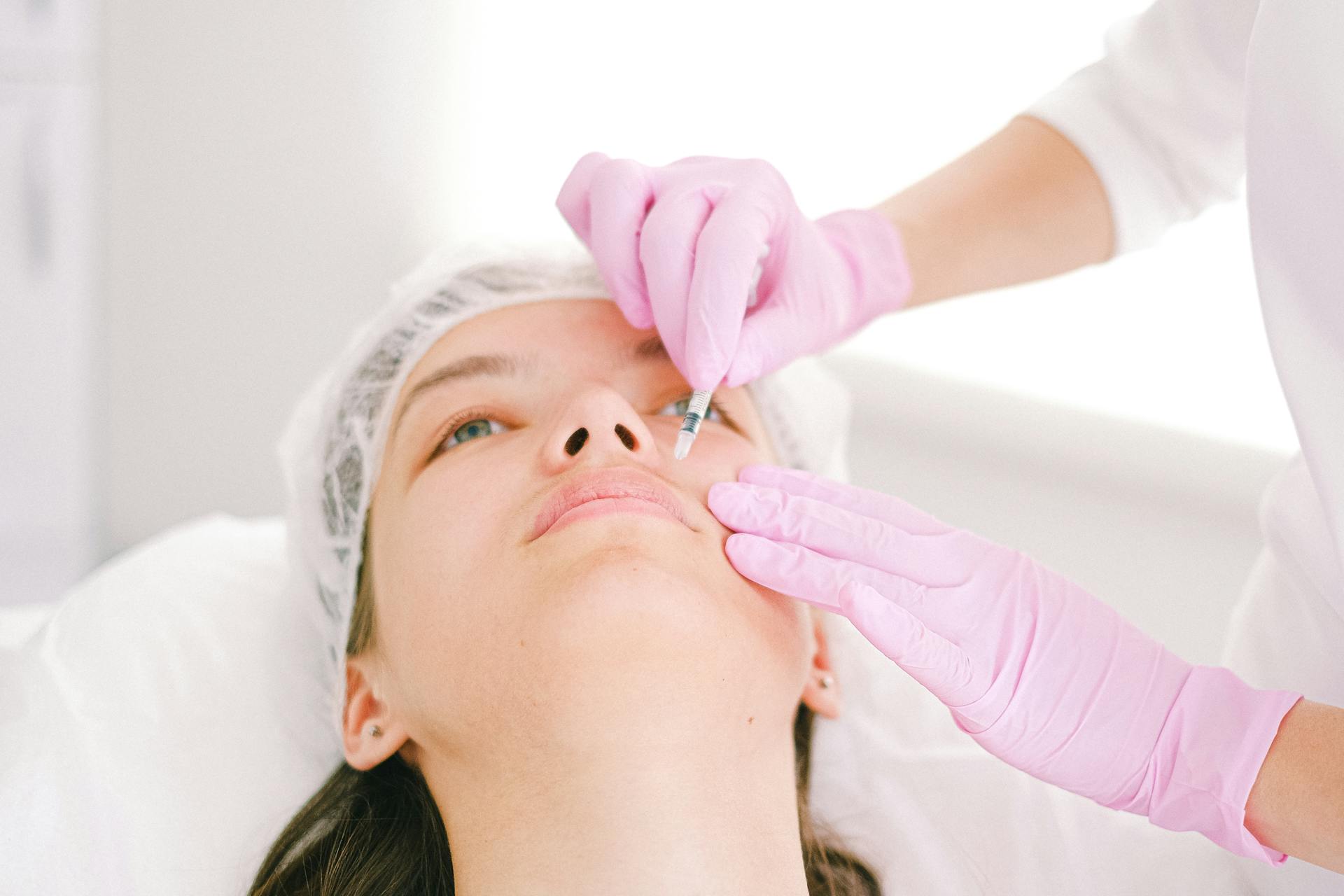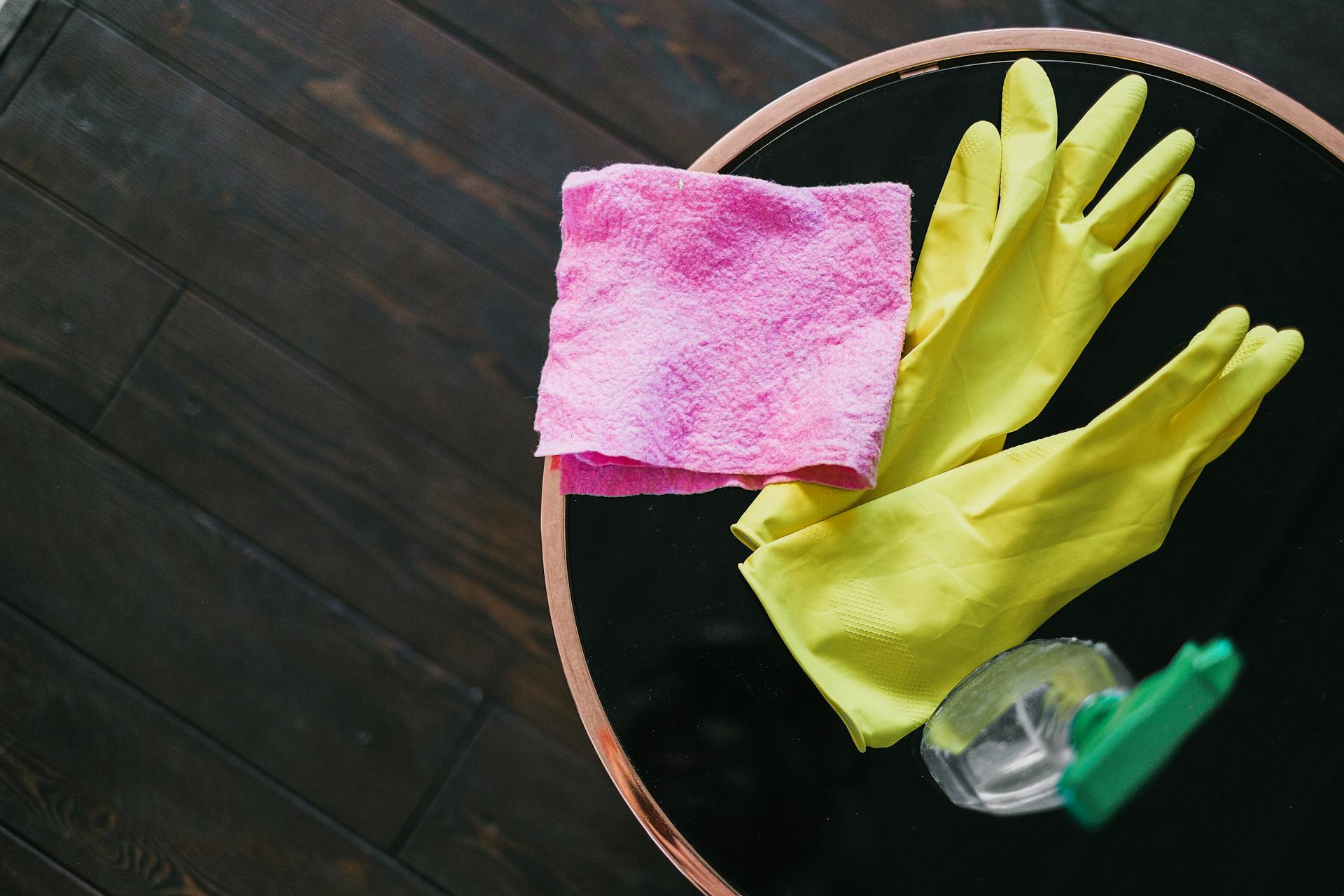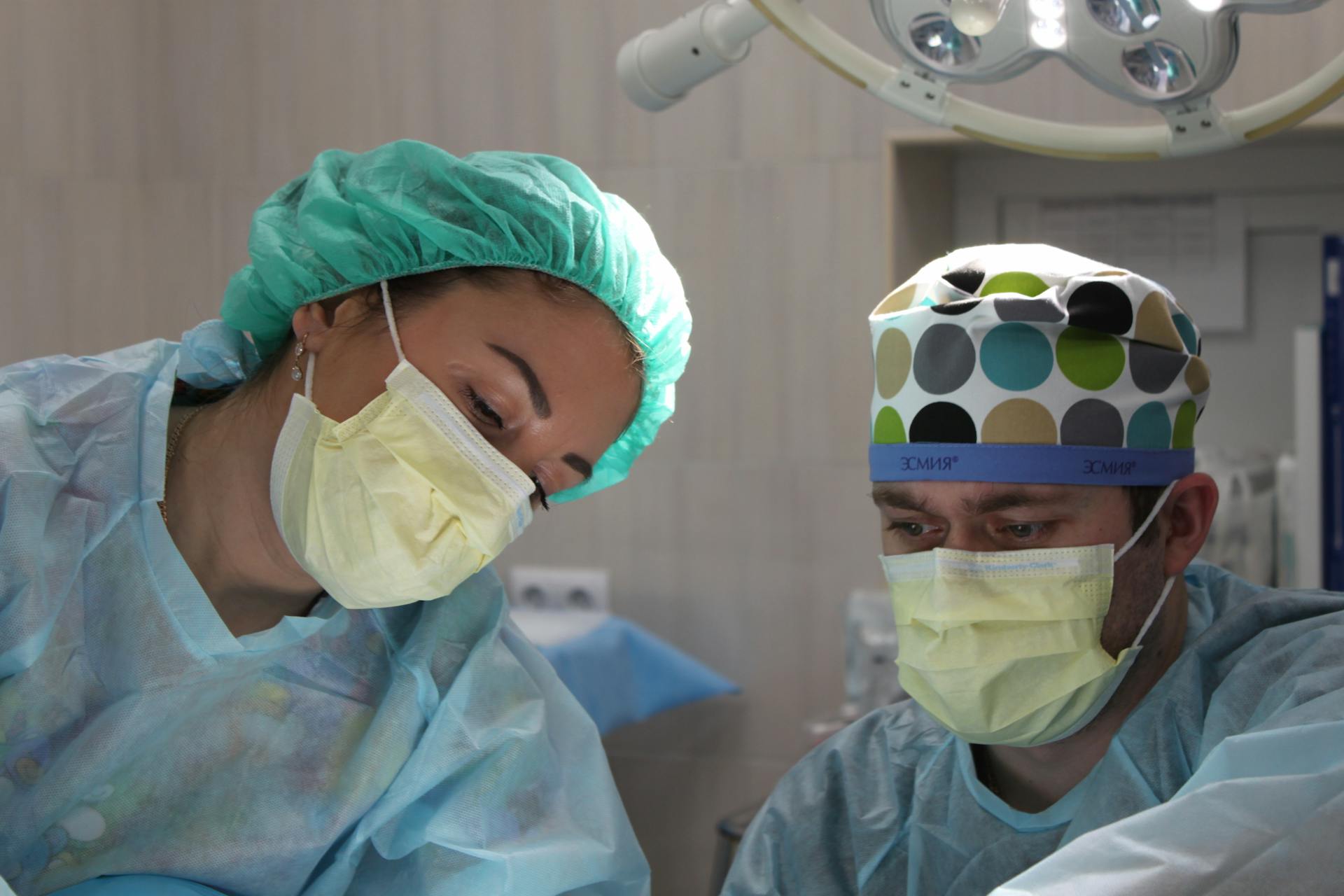
Manufacturers and sellers of cosmetic products face a unique set of risks, including product liability claims. This can be devastating to a small business or startup, with some claims reaching up to $1 million.
Cosmetic product liability insurance is designed to protect against these types of claims, which can arise from a wide range of issues, including product defects, labeling errors, and even allergic reactions.
To be effective, a cosmetic product liability insurance policy must cover a broad range of risks, including product defects, labeling errors, and advertising injuries.
A good policy will also provide coverage for defense costs, including attorney fees and court costs, which can quickly add up in a lawsuit.
Worth a look: Business Insurance Claims Examples
Cosmetic Product Liability Insurance Basics
You don't technically need insurance to sell your handmade goods, but it's highly recommended, especially when dealing with corrosive chemicals in products like bath bombs and soaps.
Craft fairs and events can be a great way to sell your products, but they also come with risks, such as allergic reactions or other issues involving the public.
Unless you're prepared to handle any potential issues that may arise, having insurance in place is a good idea to protect yourself and your business.
You can get cosmetic insurance to cover yourself and your business in case something goes wrong, giving you peace of mind and financial protection.
For more insights, see: Business Insurance Products
Who Needs Coverage?
If you're responsible for the design, manufacture, sale, or distribution of a cosmetic product, you need product liability insurance. This applies to any business or individual that manufactures their own product, even if the manufacturing is subcontracted out to another operation, including overseas operations.
You're liable if you directly import the product, designed the product, or your name is on the product. Your annual sales volume, sales stream, and the origin of the product also play a role in determining the cost of insurance.
As a cosmetic manufacturer, you work with a broad range of clients, from independent consultants to large retailers, and you must ensure that all of your hard-working employees are working in a safe environment and that the commercial space you operate out of is taken care of.
Here are some examples of businesses that need product liability insurance:
- Skincare manufacturers
- Distributors of cosmetic products
- Companies that import cosmetic products
- Businesses that design and manufacture their own cosmetic products
These businesses need to safeguard themselves from unexpected incidents, such as multi-million dollar lawsuits, and having the right type of cosmetics manufacturers insurance coverage can help protect them from financial risks.
Manufacturers
If you're responsible for designing, manufacturing, or distributing a product, you're likely liable for it. This applies even if you subcontract the manufacturing to another operation, as long as your name is on the product or you directly import it.
As a cosmetics manufacturer, you produce a wide variety of products, from lipstick to foundation, and from eye shadow and mascara. You work with a broad range of clients, from independent consultants to large retailers.
Many insurance carriers won't write product insurance for cosmetics, skincare products, or perfumes, but some brokers have access to these markets. Our long list of carriers gives us access to product liability markets that many other brokers don't have.
Here are some types of insurance policies recommended for cosmetics manufacturers:
- Products Liability: protects against financial risks associated with legal claims if your products malfunction and cause injuries.
- Commercial General Liability: protects against third-party injuries or property damages caused by you or your employees.
- Commercial Property: protects the physical structure of your business and its contents from damage or loss.
- Workers' Compensation: covers the cost of medical care and lost wages for employees who suffer work-related injuries or illnesses.
Business interruption exposure can be high because a large loss can result in lengthy downtime for repairing or replacing production equipment.
Selling Bath Products
Selling bath products can be a fun and creative venture, but it's essential to consider the potential risks involved. Unless you're attending a craft fair or event, you don't technically need insurance to sell your handmade goods.
However, selling bath bombs and soaps comes with a greater risk due to the use of corrosive chemicals and the risk of allergies. This is why having insurance in place is highly recommended.
Suggestion: Risk Management in Insurance Business
Policy Selection and Rating
Selecting the right product liability insurance policy for your cosmetics business requires careful consideration of several factors. Your policy will be rated based on the type of product you're insuring, with different products carrying different levels of risk.
To determine the amount of coverage you need, consider the claims or allegations that your vendors require you to have, as well as the potential losses your company could face if sued.
Here are some key factors to consider when selecting a policy:
- Do you have a contract with the manufacturer that names you as an additional insured?
- What is the product you're insuring, and how many will be distributed into the market?
- Who is manufacturing your product, and where are they located?
- How clearly defined are the usage instructions, directions, and guarantees provided with the product?
- What claims does the manufacturer or distributor make about the product?
How to Select the Right Policy for Businesses
To select the right policy for your business, you need to assess your business needs. Consider the size of your business, the types of products you sell, and your risk factors.
The type of product you're selling is a crucial factor in determining the right policy. For example, if you're selling cosmetics that are known to cause allergic reactions, you may need a policy that provides coverage for product liability claims.
A fresh viewpoint: Dxc Selling Insurance Business
If you're not manufacturing the product, check if the manufacturer has named you as an additional insured on their policy. This can affect the rating of your policy.
You should also consider how many products will be distributed into the market, what they're used for, and how long they're intended to last. This information can help you determine the level of coverage you need.
The ingredients and formulation of your products are also important factors to consider. You should also check where the products are manufactured and who is manufacturing your product.
Clearly defined usage instructions, directions, and guarantees or warranties can also impact your policy rating. Make sure to review these details carefully.
Here are some key factors to consider when selecting a policy:
- Product type and ingredients
- Manufacturing process and location
- Product usage and intended lifespan
- Claims made by the manufacturer or distributor
- Vendor requirements and potential losses
- Business size and risk factors
Manufacturing's Perils
Manufacturing cosmetic products can be a high-risk endeavor, especially in India where consumer safety concerns are paramount. Consumer safety concerns are a major issue for cosmetics businesses in India, as any adverse reactions or harm caused by a cosmetic product can lead to serious health concerns and potential legal claims.

Quality control challenges are another significant risk, as the diverse range of ingredients used in formulations can lead to manufacturing defects, contamination, or unintended side effects. Ensuring the safety and quality of cosmetic products is crucial, given the complex nature of their formulations.
Regulatory compliance is also a challenge, as the cosmetics industry is subject to stringent regulations and standards to ensure product safety. Failure to meet these requirements can result in legal liabilities, which Product Liability Insurance can help mitigate.
Supply chain risks are another potential pitfall, as cosmetics businesses often source ingredients and products from various suppliers. This can lead to liabilities arising from defects or issues with components sourced from third-party suppliers.
Here are some key risks associated with manufacturing cosmetic products in India:
- Manufacturing defects
- Contamination
- Unintended side effects
- Supply chain risks
These risks can have serious consequences, including financial losses and damage to a company's reputation.
What's Required?
As a cosmetics business owner in India, you're probably wondering what's required to get the right insurance coverage for your products. You need to consider the unique risks associated with manufacturing and selling cosmetic products, which can lead to serious health concerns and potential legal claims.
You'll need to ensure that your business has the necessary insurance coverage to protect against bodily injury or harm caused by your products. This is where Product Liability Insurance comes in, which provides coverage for legal liabilities related to product safety and regulatory compliance.
You should also be aware that the cosmetics industry is subject to stringent regulations and standards, and failing to comply can lead to serious financial consequences. Product Liability Insurance can help mitigate these risks by providing coverage for legal defence costs, settlements, or judgments.
To get the right insurance coverage, you'll need to consider the types of insurance policies recommended for cosmetics manufacturers, such as Product Liability, Commercial General Liability, Commercial Property, and Workers' Compensation.
Here's a breakdown of the types of insurance you may need:
- Product Liability: Covers financial risks associated with legal claims if your products malfunction and cause injuries.
- Commercial General Liability: Protects you from third-party injuries or property damages caused by you or your employees.
- Commercial Property: Covers physical damage to your business, including equipment, inventory, and property.
- Workers' Compensation: Covers medical expenses and lost wages for employees who suffer work-related injuries or illnesses.
By having the right insurance coverage, you can protect your business from financial devastation and ensure that you're able to continue operating and growing in the competitive cosmetics market.
Understanding Coverage
Product Liability Insurance provides coverage for a range of risks associated with the manufacturing, distribution, and sale of cosmetics products.
Third-Party Liability coverage is a must-have for any business, as it protects against bodily injury, property damage, or financial loss suffered by third parties due to a defective or harmful product.
Manufacturing Defects coverage is also crucial, as it protects against claims arising from defects in the manufacturing process that render a product unsafe or substandard.
Inadequate Warnings or Instructions coverage is important, as it protects against claims alleging that the product lacked proper warnings or instructions, leading to user injuries or property damage.
Some common types of cosmetics crafts covered by Product Liability Insurance include bath bomb making, soap making, hair, nail and beauty products and services, skincare products, bath salts, scrubs, oils and lotions, and shower products.
Here are some of the key coverages provided in a typical Product Liability Insurance Policy:
- Third-Party Liability: Coverage for bodily injury, property damage, or financial loss suffered by third parties due to a defective or harmful product.
- Manufacturing Defects: Protection against claims arising from defects in the manufacturing process that render a product unsafe or substandard.
- Inadequate Warnings or Instructions: Protection against claims alleging that the product lacked proper warnings or instructions, leading to user injuries or property damage.
- Coverage for Product Recalls: Reimbursement for expenses related to recalling and replacing defective products, including communication costs and the disposal of recalled items.
- Legal Defence Costs: Coverage for legal expenses incurred in defending against product liability claims, including court fees, attorney fees, and other related costs.
- Compensatory Damages: Coverage for compensatory damages awarded to claimants in the event of a product liability lawsuit.
- Non-Manufacturing Entities Coverage: Extension of coverage to include entities involved in the distribution, retail, or sale of the insured product.
- Completed Products Coverage: Protection for claims arising from products that have already been sold or distributed.
Frequently Asked Questions
Does an LLC need product liability insurance?
Yes, even with liability protection, an LLC can still be sued and have assets seized, making product liability insurance a crucial protection for businesses. Consider investing in product liability insurance to safeguard your business against costly damages.
Does CGL cover products liability?
Yes, Comprehensive General Liability (CGL) policies typically cover product liability under the "products hazard" provision. This coverage protects policyholders from legal liability for accidents involving their products, even when they occur outside their premises.
Sources
- https://castlerockagency.com/cosmetic-beauty-product-liability-insurance/
- https://www.bimakavach.com/blog/product-liability-insurance-for-cosmetics-business-a-comprehensive-guide/
- https://www.veracityinsurance.com/beauty-cosmetics-product-liability-insurance
- https://craftcover.com/insurance-for-bath-and-shower-businesses/
- https://ekinsurance.com/cosmetics-manufacturers-insurance/
Featured Images: pexels.com


